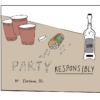Sleep is regenerative and renewing, but does an hour-long nap really boost your brain power?
A recent study by researchers at Saarland University seems to confirm this. In their investigation of power naps, researchers created two groups from 41 participants and assigned them memory tasks. Participants looked at single words and word pairs and attempted to memorize them. Later, the groups split off. The control group watched DVDs for 45 to 60 minutes, while the test group slept. The results were highly conclusive: it seemed as though the participants in the test group remembered many more of the words and exhibited greater memory capacity overall.
Image Source: Science Photo Library – PASIEKA
Power naps are proven to be beneficial to memory, but how else are they useful in daily life? Apart from memory enhancement, naps also provide other benefits, like enhancing physical performance and alertness. According to an experiment conducted at NASA, with only a 40-minute nap, daily performance is boosted 34% and alertness is boosted almost 100%! Clearly, these physical benefits would be useful to someone who is driving or carrying out any other attention-demanding task. Additionally, one of the most helpful aspects of a nap is that it relaxes and soothes—something most people know from experience.
So how does one exactly take a nap? Is there some method to it, or do you just plop down on a pillow and start snoring?
Well, actually, to maximize the benefits of a short nap, there are some tips and guidelines to follow. One of the most important tips that people tend to forget is that naps are more effective when scheduled—just like you have a sleeping schedule at night, it is suggested to nap at consistent times, or you risk messing up the patterns of your internal clock (circadian rhythm). Another seemingly obvious tip is to limit the amount of time you nap for (remember, it’s a nap, not hibernation)–recommended amounts fall between 30-60 minutes. Other small factors, such as sleeping in a warm and dimly lit room, also provide for a stress-free snooze.
The expression “sleep is battery-recharging” is a fact after all; naps have undeniable positive effects, including their ability to boost memory and brain performance, and are definitely restorative. Naps can help contribute to a better lifestyle and would be a valuable addition to your schedule, so don’t be afraid to give them a try!
Featured Image Source: smerikal










